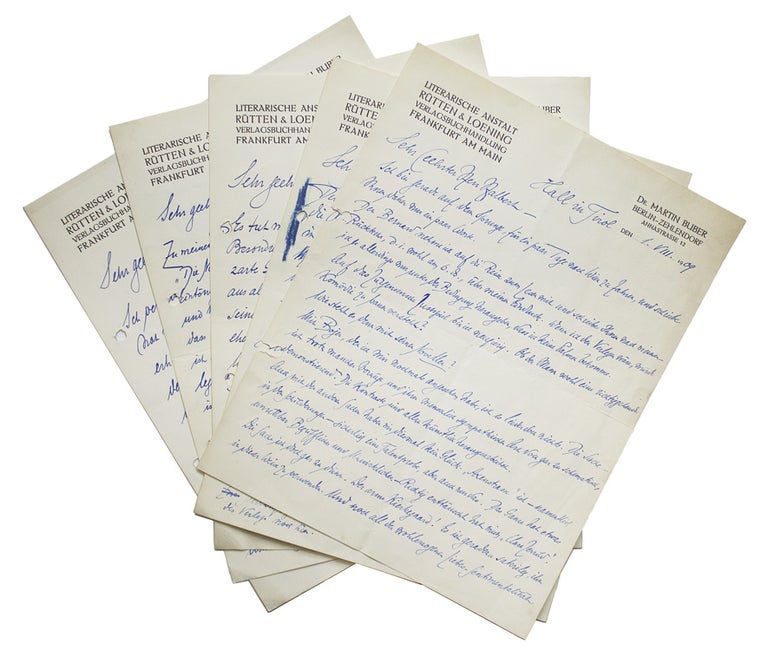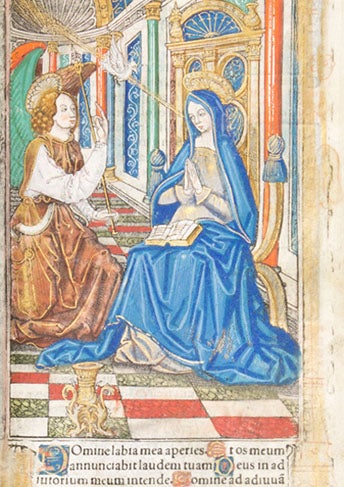
A collection of 5 Autograph Letters Signed ("Buber") and 1 Autograph Postcard Signed ("Buber"), to a Mr. A. Halbert.
Hall in Tirol (Austria) and Berlin: August 1-October 25, 1909.
Price: $1,750.00
About the item
7 pp., letters on Rütten & Loening letterhead. 4to. Hole punches in left margin, folding creases, light marginal soiling but near fine.
Item #306330
A group of letters by the Jewish writer and philosopher Martin Buber (1878-1965), then serving as Editor in Chief for the Berlin publisher Rütten & Loening, to a literary agent who had submitted manuscripts of several different writers, mainly to reject the offerings but not without encouragement. The earliest letter in the group finds Buber touching base about the submissions before he embarks on a trip:
“My dear Mr. Halbert, I am just on the verge of going to Vienna for a few days ... I have been taking and reading the Bernard with me while traveling and will write you about my impressions of it on my return. If I were the publisher, I would want it, but would want an out on the condition that is not completed yet. I am curious about the Jürgensen comedy. Is the man sure which is the right direction in which to build his comedy? What can you tell me about his novellas? My Bojer, which I viewed once again, is unfortunately nothing. The thing is there are some benefits, and there are some advantages, and their human characteristics too schematically sympathetic, demonstrably. The contrasts are all artificially elaborated….”
Buber is unenthusiastic about two of the manuscripts in a follow up letter of August 12: “The Bernard is not something that I can recommend to the publisher; the anecdotes are often drawn from doubtful sources, in general unconvincingly told, and on whole the thing is not a whole. What he is precisely trying to convey is just not clear. For the sake of Bojer, I would like to write the publisher today. But I have little hope of what may come of it. 900 Marks! Perhaps I should release it from my custody now rather than later for everyone’s sake. Rasmussen’s passion play is unlikely to come into consideration for us. Perhaps just a novel by him. Unfortunately, I also have the Gnudsmann. The synopsis is not thrilling. I am waiting for a sample….”
Having had more time to read the material, on September 21 Buber unambiguously rejects one of the submissions: “I am sorry, but — I do not find this book of Bojer's to be anything special. The tales are quite charming, sometimes even quite delicate, but that's all. Bojer just seems to have completely stopped developing this all this out." But he immediately adds: "If you are offering us his next novel, we may very well come to an agreement.”
On October 21 he turns down a new batch: “I regret that none of the three works are for our publishing house. “Die Nordbürger” is a very good story, but oppressively monotonous and much less significant than Bojer’s and Knudsen’s related works. As for the "Duchess of Choiseul,” Sven Lange is to me a strange name; the substance is not uninteresting, but it is also nothing has really been made of it. And "The Lost Battle"—I return it with the same card that I received it from you ... In my eyes, it is a meaningless, trivial, period piece thriller, which does pay out the rewards one should expect for the effort brought to it. I must say, I do not think you meant for me to peruse this narrative, and would like to suggest that it is just a mix-up, that perhaps the card was meant to be mailed to someone else, to whom you sent another manuscript.”
In this letter as the others he asks after works by the Danish writer Jürgen Jürgensen (1872-1953), and in the final letter in this group he writes: “Kiy has informed me that they have received 13 stories by J[ürgensen] from you, but not yet the publisher. Since we want the short stories to be published in the autumn of 1910, I also think we should soon consider including a few pieces previously published in magazines, so I’m asking if you can please send to the publisher what you sent to Kiy so they can seriously approach the matter.” Rütten & Lening did indeed publish Jürgensen’s “Fieber” in 1910 its Literarische Anstalt series, translated into German by Hermann Kiy.
The recepient of the letters, A. Halbert, would seem to be Awrum Halbert, a pseudonym of the Romanian-born German Jewish writer Albert Ganzert (1881-1965), poet, novelist, dramatist, and critic.
Buber was hired by Rütten & Lening in 1905 to revitalize and modernize its publishing program, and he served as Editor in Chief for ten years. Among his great successes was a series of monographs on modern society. “The contributors found by Buber included friends, acquaintances, former teachers, but also authors whom he admired and distinguished personalities from a range of areas, such as Werner Sombart, Georg Simmel, Gustav Landauer, Eduard Bernstein, Franz Oppenheimer, Ellen Key, Lou Andreas Salome and others. Contemporary newspaper articles praised the originality and freshness of the books in the series. Buber and the Literarische Verlagsanstalt were among the founders of sociology in Germany” (Zank in “New Perspectives on Martin Buber” p 16).

